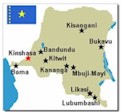 UNITED NATIONS (FinalCall.com)�A transitional
government is set to take control June 15 of the political process in
the Democratic Republic of the Congo (DRC), according to a UN Security
Council report released on May 14.
UNITED NATIONS (FinalCall.com)�A transitional
government is set to take control June 15 of the political process in
the Democratic Republic of the Congo (DRC), according to a UN Security
Council report released on May 14.
Fifteen representatives from the Security Council
toured nations in Africa�s Great Lakes region from April 27 to May 7.
Presenting the report of the Council�s third mission to the region,
French UN ambassador Jean-David Levitte said the groundwork for
establishing a transitional government in the DRC has been put in place.
Among the mission�s recommendations was the
absolute need to respect the ceasefire and the need to include all
concerned parties in the peace process. �The inter-Congolese dialogue
has made remarkable progress in its recent meeting in Sun City, South
Africa, including the adoption of texts which describe the basis for the
transition period that leads to democratic elections,� Ambassador
Levitte told the Council.
Mr. Levitte recalled that between two to three
million people in the DRC had been killed since the latest war started
in 1998. In August 1998, the armies of Uganda, Rwanda and Burundi
entered the DRC saying that they were concerned with their security. The
armies of Zimbabwe, South Africa and Angola aided then DRC President
Laurent Kabila in defending his nation. Former U.S. Secretary of State
Madeline Albright called the conflict �Africa�s first world war.�
Mr. Levitte said what struck members of the Council
who traveled to the region was the feeling among the Congolese people
that all foreign troops must withdraw and the plundering of natural
resources must stop.
But the Council is recommending the establishment
of a �curtain of troops� that would be placed on the eastern border of
the DRC, the border shared with Rwanda, Uganda and Burundi.
The representative of Rwanda, Anastase Gasana, said
his country�s concerns for its own security had captured the Security
Council�s attention. �The Rwandan government recognizes the importance
of the work of the inter-Congolese dialogue in assuring lasting peace in
the region,� Mr. Gasana said. However, he added that his government had
concerns about the presence in the DRC of the �planners and authors of
the 1994 Rwandan genocide.�
�We want to be assured that these people no longer
have any political, military, material or financial support in the DRC,�
he said.
DRC UN ambassador Aoki Ilka told the Council that
President Joseph Kabila had stated that his government did not support,
would not support, armed groups in destabilizing Rwanda. �President
Kabila is determined to consolidate the peace process in the Great Lakes
region,� the ambassador said.
The Burundian representative said his country
supports the proposal for the creation of a buffer zone. �We also hope
that the inter-Congolese dialogue continues and becomes as inclusive as
possible,� Marc Nteturuye said, adding that he is interested in the
disarmament, demobilization and reintegration of armed groups, including
Burundian rebels.
However, activists charge the Security Council has
once again applied the double standard where Africa is concerned.
�The Congolese people are being asked to sit down
and form a government with those responsible for killing our people,�
Professor Yaa-lengi M. Ngemi, head of the Congo Coalition said,
referring to the Sun City agreement, that rebel leader John-Pierre Bemba
of the Mouvement de Liberation du Congo (MLC), serve in the transition
government as prime minister.
Elombe Brath, head of the Harlem-based Patrice
Lumumba Coalition, said Africans must decide the future of the DRC, not
the UN. �The Security Council is simply buying time while the rape of
the Congo�s resources continues. The UN works in the interest of the
mining conglomerates and men such as Mr. Bemba are complicit in the
robbery of the Congolese people�s natural resources,� he added.
On May 13, the website www.allafrica.com reported
that the six-member Ugandan commission ordered to investigate
allegations of the illegal exploitation of Congolese timber, diamonds
and gold told a Ugandan general that he faced jail if he did not appear
before the committee later this month.
Ugandan People�s Defense Force commander
Major-General James Kazini, according to the report, had failed on
several occasions to appear, and if he does not appear on May 20, he
will be arrested, committee officials said.
�The UN should have sanctioned Uganda and Rwanda
last year after the report surfaced that officials from those countries
made huge profits stealing our resources, and it continues,� Prof. Ngemi
said angrily.
Mr. Brath and Prof. Ngemi suggested that the
African Union give Uganda and Rwanda an ultimatum: �Get out of the DRC
now or face all of our armies.�
However, the
International Crisis Group, a conflict resolution think-tank, said what
is needed in the Great Lakes Region now is a regional conference, so
that a final pact of non-aggression may be established. The think-tank
report also said that at the conference mutual economic, trade and legal
agreements could be hammered out.

![]()